- Home
- Mike Lupica
Heavy Hitters
Heavy Hitters Read online
Contents
Title Page
Dedication
Chapter 1
Chapter 2
Chapter 3
Chapter 4
Chapter 5
Chapter 6
Chapter 7
Chapter 8
Chapter 9
Chapter 10
Chapter 11
Chapter 12
Chapter 13
Chapter 14
Chapter 15
Chapter 16
Chapter 17
Chapter 18
Chapter 19
Chapter 20
Chapter 21
Chapter 22
Chapter 23
Chapter 24
Chapter 25
Chapter 26
Chapter 27
Chapter 28
Chapter 29
Chapter 30
Teaser
Acknowledgments
About the Author
Books by Mike Lupica
Copyright
“I’ve made a decision,” Cooper Manley, known as Coop, was saying. “I don’t want to grow up.”
It made Ben McBain smile. But then that happened a lot when Coop was around. He was funny even when he wasn’t trying to be.
“I don’t think it’s going to be a problem for you,” Ben said. “Not growing up, I mean.”
Sam Brown said, “Not gonna lie, the rest of us just figured that you’re as mature as you’re ever going to get.”
“But he can get more immature, right?” Shawn O’Brien said.
“Absolutely!” Ben said. “I’ve got Coop’s back on that one. I think he can get a lot more immature than he already is.”
“Go ahead, make fun of me all you want,” Coop said.
“Okay,” Sam said.
“But you know I’m right,” Coop said. “Which one of you wouldn’t want to stay eleven forever?”
“I’m down with it as long as I get to grow,” Ben said. The smallest of them, by a lot. “Because I’d sure like to start doing some growing one of these days.”
Now Sam was the one smiling, saying, “Coop feels the exact same way about his brain.”
They all laughed: Coop, Sam, Shawn. Ben McBain’s three best guy friends in the world. Friends, buds, teammates. “A band of bros” is the way Coop liked to put it. When Lily Wyatt was around, they called themselves the Core Four Plus One. Shawn joined the group when he moved to town, started sixth grade with them at Rockwell Middle School, and ended up playing football and basketball with them.
It hadn’t been easy with Shawn at first, especially in football, with Ben and Shawn both competing for the quarterback spot last fall. And Shawn had been handed the job first, by his dad, a former NFL quarterback coaching the team, once the greatest player to ever come out of Rockwell. But Ben had finally beaten him out. Shawn became a solid tight end for them and the Rockwell Rams ended up winning the Butler County League when Ben threw a Hail Mary pass to Sam at the end of the championship game.
As soon as football season ended, it was time for basketball to start. The Rams didn’t win the championship in basketball, mostly because Sam suffered a bad ankle sprain practicing with Ben one day, and missed almost the whole regular season. But Sam had come back for the last game and they had beaten Darby — their biggest rival in just about everything except texting — to spoil Darby’s undefeated season. All of them walking away from that game feeling like champs, having shown Darby and its star player Chase Braggs how things laid out when the sides were even.
Now school was out, summer was officially starting for them. The Little League season was over in Rockwell and the All-Star team had been selected for the Butler County League. Ben and Sam and Coop and Shawn had all made it. They were about to have their first practice, Sam’s dad coaching them, Ben’s dad assisting him, the Core Four guys sitting high up in the bleachers at Highland Park, waiting for the rest of the team to arrive. Coop was doing most of the talking, because no one could talk like Coop.
Talking about wanting to keep things the way they were right now forever. Coop so ready for another baseball season to begin that he was already wearing his shin guards, having been a catcher from the first time he and Ben and Sam had played together, when it was still their dads pitching to them.
“Just look at how good we’ve got it in terms of baseball,” Coop said. “We already had one season, even if we were all on different teams. Now we not only get a do-over on the season, we’re all together the way we were in football and basketball. And it’s summer. And you know what summer means.”
“No more Cs for you in math?” Sam said, trying to sound helpful.
Coop just gave him a disgusted look. Ben knew the deal with Coop, it was like football announcers said sometimes on television: You couldn’t stop him, you only hoped to contain him.
Coop said, “Summer means we don’t have to worry about anything having to do with school — other than maybe summer reading, which I don’t think about until, like, August — for almost three whole months. All we have to do is play baseball and hang out. And you know what’s better than that? Nothing is better than that. Which is what I’ve been trying to explain to you boneheads.”
“Wait, I figured it out,” Shawn said. “Coop doesn’t want to be Buster Posey.” He was the Giants’ catcher and had been the MVP and was Coop’s current favorite player. “He wants to be Peter Pan.”
“Actually,” Sam said, “the way his mind jumps around, he does remind me a little bit of Tinker Bell.”
Coop turned to Ben now and said, “Help a brother out. They’ll listen to you, they always do, and I know that you know that what I’m saying makes sense.”
“Some of it,” Ben said.
“Thank you!” Coop said.
“I said some of it,” Ben said. “Eleven has been a cool age, no doubt. But the way I look at it, why shouldn’t we think things aren’t going to get better as we get older, in sports and everything else?”
“Wait,” Sam said, “does that mean Lily can get cooler than she already thinks she is?”
“Hard to believe,” Ben said, “but certainly doable.”
And just like that, almost on cue, they could hear Lily Wyatt’s voice from behind the bleachers, Lily saying, “I’m here.”
They had been swimming in Shawn’s pool earlier in the afternoon and Lily had told them she might bike over and watch some of their first practice, Lily loving baseball more than any girl they knew, maybe because she was such a total star as a pitcher and hitter on her softball team. But Ben knew it wasn’t just a love of baseball bringing her to Highland Park, it was the fact that the rest of the Core Four was here, and Lily was afraid she might miss something.
Fun, mostly.
The pure fun of all of them being together on a summer night like this.
She made her way up the bleachers on long legs, taking three rows at a time, waving a hand when she got to them, her way of telling Coop to slide over. Lily sat down next to Ben, and said, “What’s good, Big Ben?”
It was what she called him, not as a joke, not to be sarcastic or make fun of his size, but because she was the one always telling him that the only size that mattered in sports was the size of your talent and the size of your heart. She called him Big Ben because of that, because of the kind of teammate he was.
And the kind of friend she was.
“Getting ready to play my favorite sport, Lils.”
“Which means,” Coop said, “whatever sport that’s in season.”
Lily gave Ben a long look. “What is your favorite, really?” she said.
“Haven’t decided yet,” Ben said.
“Where do you think they’ll put you this season,” she said, “second or short?”
&nb
sp; “Mr. Brown says he’s thinking short, my arm is wasted at second,” he said. “But you want to know the truth? I don’t care where I play.”
Ben had played both second and short in Little League this season. And pitched in relief. Even played the outfield occasionally. To Ben, it was the beauty of baseball, at least at their age: You didn’t have to be just one thing. It was different in football, Ben had always seen himself as a quarterback even when his coaches couldn’t see past his lack of size and kept playing him somewhere else, before he got his chance to show everybody this past season that he had the arm and the game and the judgment to be the one thing you always wanted to be in sports:
A game changer.
In basketball he was a point guard, a better passer than he was a shooter — even though he’d beaten Darby with a last-second fallaway over Chase Braggs — and always believing that all good ball started with a good pass.
Baseball was different. You really did have to be a lot of things in baseball: Hitter, fielder, thrower, runner. All that. Ben was a born leadoff man, not because his size made him tough to pitch to, but because he could hit, had the bat speed for it, because he had the eyes to spot a pitch he could hit hard somewhere. Every year he’d surprise more people with how hard he could hit a baseball, the way he kept surprising people with how far he could throw a football.
He loved to hit, loved to pitch, loved to make a good stop and throw a guy out at first by a step. Mostly, he just loved to play. Loved the downtime you got in baseball between pitches when you were in the field, waiting for the moment when the ball would be in play and it seemed as if everything was happening at once, guys on the bases, decisions to be made about what to do with the ball if it was hit to you, or where you needed to be if it was hit to somebody else.
Greg Brown, Sam’s dad, who’d been a star pitcher at Rockwell High and a decent player at Richmond after that, liked to say that baseball was “the greatest game ever invented by mortal minds.” And sometimes on a night like this, with the grass freshly cut and the lines looking as white as they could be and the infield dirt looking as if nobody had played on this field all spring — everything looking clean and new — Ben thought that Mr. Brown might just be right.
“Basically,” Ben said to Lily, “I don’t care where I play as long as we win.”
“Shocker,” Coop said. “Totally.”
Ben could see other players starting to show up now, even though practice wasn’t scheduled to start for another half hour at least. Justin Bard, the middle linebacker on their football team, was walking slowly across the outfield grass with Darrelle Clayton, a fullback from football and a shooting guard from basketball, who was probably going to play left field. Darrelle was fast and good. But Justin was great, maybe even a better all-around baseball player than Sam was, which was saying a lot, because Sam could crush it as a center fielder and was a lock to hit third in front of Justin.
Justin Bard was a left-handed hitter with more power than anybody in the Butler County League that Ben had ever seen, was a lock-down fielder at first base, and had a good enough arm, and enough confidence in it, to throw across the diamond and nail guys at third when the other team would try to put a bunt down on him.
As good a linebacker as Justin was, as much ground as he could cover, he was better in baseball. By a lot. Absolutely no doubt with him what his favorite sport was, he already talked about making it to the big leagues someday.
“You guys ready?” Ben said. “We won the league in football. Didn’t win in basketball. We’ve gone way too long without a title.” Smiling as he said it.
“Wow,” Lily said. “What’s it been, like, four whole months?”
“Hey,” Sam Brown said, “you’re telling me you didn’t feel like we won something by beating Darby the way we did in our last game?”
“Wait,” Ben said, “what did I do with the trophy they gave us for that?”
Sam said, “Aren’t you the guy always telling me there’s more than one way to be a winner in sports?”
Lily giggled. “I love it when one of you quotes Big Ben to Big Ben.”
“Whatever,” he said. “Here’s all I’m going to say, and all I want out of this season: For nobody to get hurt the way Sam did in basketball. For nothing to happen that will keep us from being the best team we can be. If it doesn’t, we’ll be the best team in the league.”
“I’m down with that,” Coop said.
“Me, too,” Sam said.
“Same,” Shawn said.
Ben said, “As long as nothing bad happens, we’ll be fine.”
They weren’t.
First league game, bottom of the last for the Rams at Highland Park, under the lights, bleachers nearly filled, Rams down a run to Parkerville, Robbie Burnett — the quarterback of the Parkerville football team and the star of their basketball team — on the mound trying to get the last three outs for his team.
Against the top of the Rams order.
Ben first, then Darrelle, then Sam, then Justin Bard.
Ben’s dad coaching at first, Mr. Brown coaching at third. Ben already had two hits on this night, had just made a diving stop behind second to save a run and maybe two, keeping the Parkerville lead at just 6–5.
But they were still down a run. And nobody wanted to lose the opener. So Ben planned to get on base any way he could, set things up for the guys coming up behind him, figuring it wouldn’t take much to get the inning — and the game — to Justin, the big stick in their lineup. It had been a terrible night for Justin so far, he’d struck out twice, once looking, and had made a bad error with the bases loaded, a ball behind the first-base bag going through his legs and allowing two runs to score. But nobody — maybe nobody except Justin — would remember any of that if he knocked in the winning run.
Unless Sam Brown beat him to it, of course.
As Ben put on his batting helmet, Sam said to him, “Anything better than a walk-off win in the first game?”
“Doubtful,” Ben said. “And not only a walk-off, a come-from-behind walk-off.”
Sam said, “He’s going to want to get ahead of you.”
“Coach already told me to go after the first good pitch I see.”
“They haven’t gotten you out all night and they’re not going to do it now,” Sam said. “You’ll score the tying run and then either Darrelle or me scores the winner.”
“Well,” Ben said, “when you make it sound so simple.”
“Just trying not to confuse you.”
“Basically what I’m hearing is that you’d like me to get on base,” Ben said.
“You really are practically a genius,” Sam said as Ben walked toward the plate, no batting gloves, he was old-school about almost everything in sports.
Robbie Burnett looked to be about twice Ben’s size standing on the mound. He not only looked like he was a high school kid, he threw as hard as one, a big right-handed beast whose only pitch was a fastball because he didn’t need anything else.
Ben wasn’t afraid of Robbie or his fastball, or a moment like this, this is why you played, for moments like this. What was there to be afraid of? If you didn’t want to be up with the game on the line, when did you?
Ben wasn’t afraid, period.
He tapped their catcher’s shin guards with his bat. Took his stance. Dug in with his back shoe, putting most of his weight back there. Set his bat high the way his dad had always taught him. There was chatter from behind him, from the Rams’ bench, but Ben could barely hear it, things always got quiet for Ben in moments like this, he was just locked in on Robbie, waiting for the first-pitch fastball he knew was coming.
Robbie’s best against his best, straight up, Robbie rocking into his motion, not much of a leg kick, just his right arm coming forward, Ben keeping his eyes on the ball as it came out of his hand, knowing the ball was going to get on him in a blink, but somehow feeling as if the game was slowing down for him at the same time.
Maybe Robbie just flat overthrew the bal
l. Or maybe he was fixed on throwing one right past Ben, getting ahead on the count.
But the pitch got away from him, the ball tailing in on Ben before he could do much to react, before he could do much more than spin to his left, his spikes catching in the dirt, Ben stumbling and falling backward, out of the batter’s box as he did, trying to get away from the ball.
Just not soon enough.
The ball caught him flush on the inside of his left arm, the soft part of his arm there, halfway between his elbow and his wrist.
The bat dropped out of his hands. Ben went down.
Mr. Brown came running in from third, Ben’s dad came down from first. When Ben looked up, Robbie was there, too, looking as if he was in more pain than Ben at the moment.
Somehow Sam and Coop and Shawn were already crouched down next to Ben, Mr. Brown having to ask them to give him room.
Mr. Brown said, “Let’s have a look.”
Ben rolled up his sleeve. It was then that he saw the imprint of the ball’s seams on the inside of his arm, like they’d been tattooed there.
Ben’s dad asked Ben if he could slowly flex his arm, see if he could make a fist and bring his arm up to his shoulder, like he was doing some kind of exercise.
Ben did that.
“It hurts where I got hit,” he said, “but not when I move it.”
“Good,” his dad said. “You probably don’t want to hear this, but the only better place you could have picked is your butt.”
Ben said, “Dad, I think the place I would have picked is no place.”
Mr. Brown asked him to clench and unclench his left fist, then give his wrist a shake. Ben did that, too. Ben’s dad gently put a thumb to Ben’s arm, between the seams. “Nothing broken, not there,” he said. “Would’ve been much worse if it got you on the elbow or wrist or hand.”
Ben looked at Mr. Brown and then his dad and said, “I’m not coming out.”
“Ice wouldn’t be such a terrible idea,” Mr. Brown said.
“What are you always saying when a guy catches one on TV?” Ben said to his dad. “Rub some dirt on it and walk it off?”
“That’s what you say to the TV,” Jeff McBain said, “not your son.”

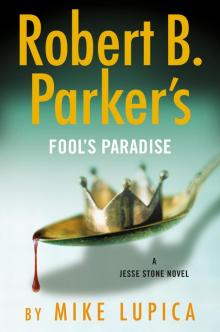 Fool's Paradise
Fool's Paradise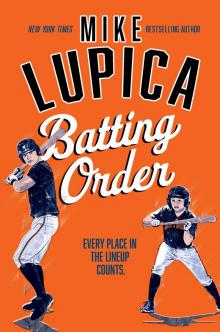 Batting Order
Batting Order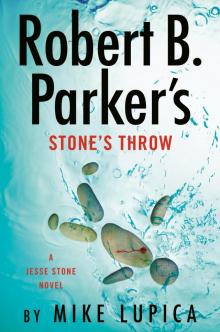 Stone's Throw
Stone's Throw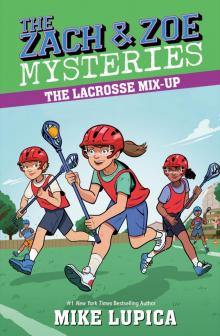 The Lacrosse Mix-Up
The Lacrosse Mix-Up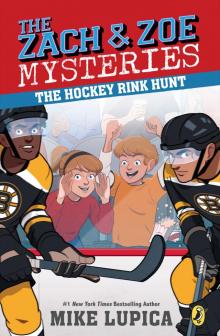 The Hockey Rink Hunt
The Hockey Rink Hunt Payback
Payback Triple Threat
Triple Threat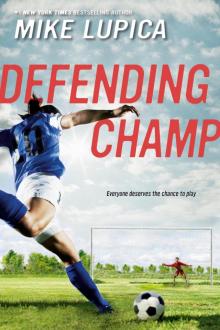 Defending Champ
Defending Champ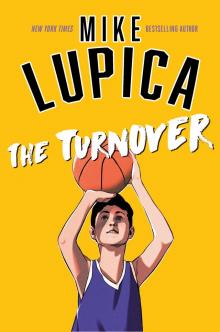 The Turnover
The Turnover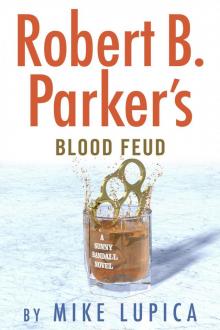 Robert B. Parker's Blood Feud
Robert B. Parker's Blood Feud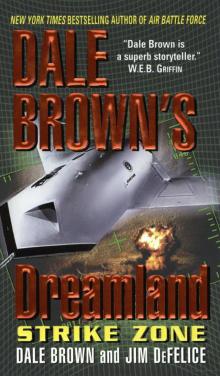 Strike Zone
Strike Zone Hero
Hero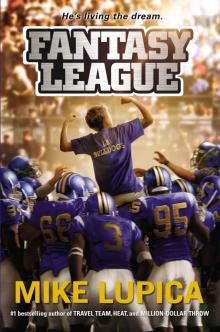 Fantasy League
Fantasy League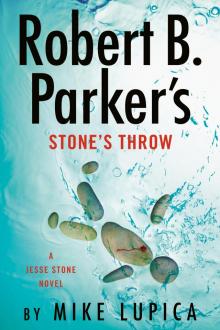 Robert B. Parker's Stone's Throw
Robert B. Parker's Stone's Throw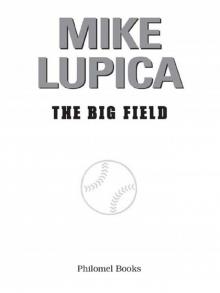 The Big Field
The Big Field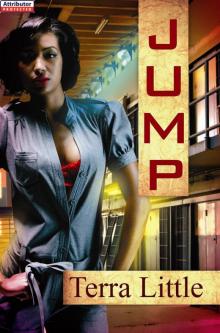 Jump
Jump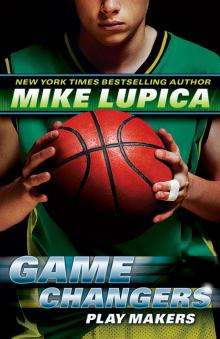 Play Makers
Play Makers The Underdogs
The Underdogs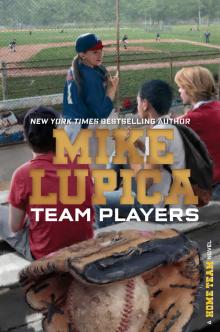 Team Players
Team Players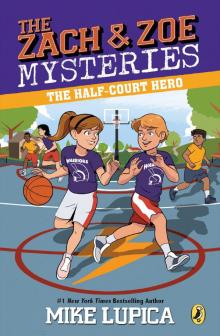 The Half-Court Hero
The Half-Court Hero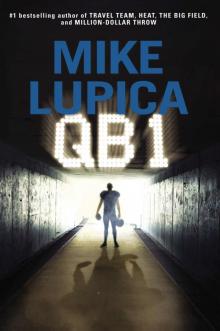 QB 1
QB 1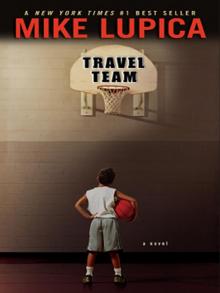 Travel Team
Travel Team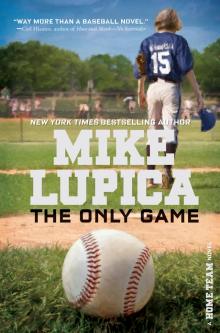 The Only Game
The Only Game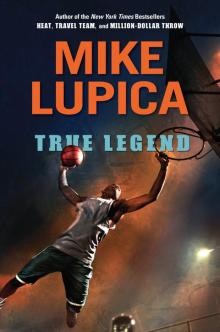 True Legend
True Legend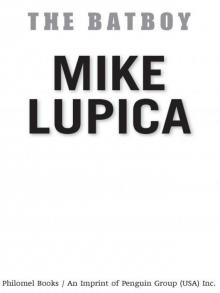 The Batboy
The Batboy Hot Hand
Hot Hand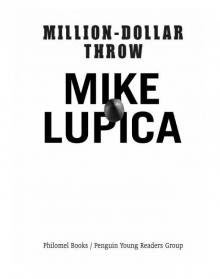 Million-Dollar Throw
Million-Dollar Throw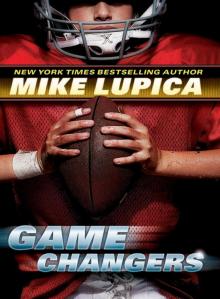 Game Changers
Game Changers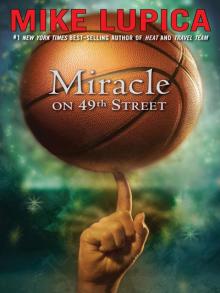 Miracle on 49th Street
Miracle on 49th Street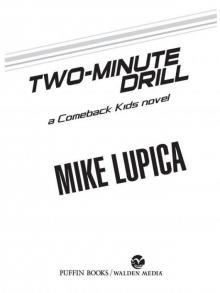 Two-Minute Drill
Two-Minute Drill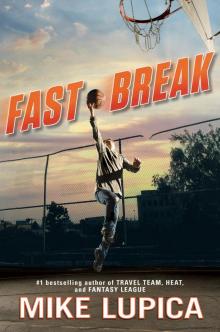 Fast Break
Fast Break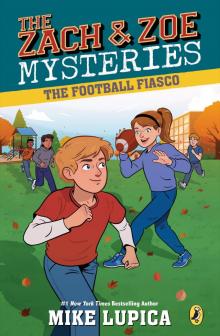 The Football Fiasco
The Football Fiasco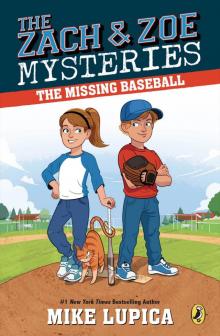 The Missing Baseball
The Missing Baseball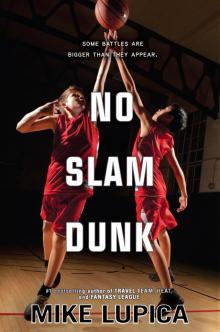 No Slam Dunk
No Slam Dunk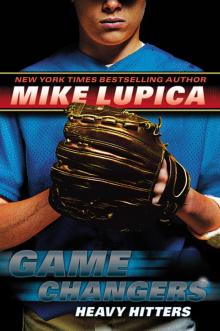 Heavy Hitters
Heavy Hitters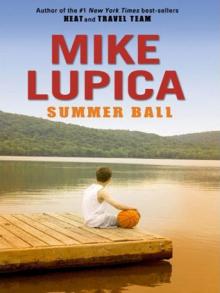 Summer Ball
Summer Ball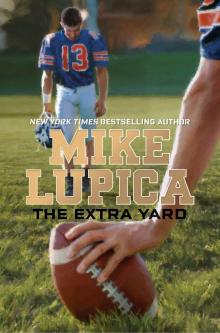 The Extra Yard
The Extra Yard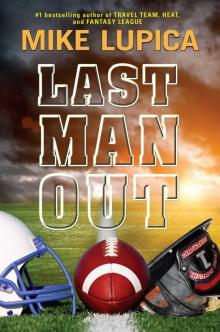 Last Man Out
Last Man Out